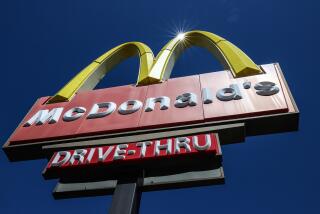Postscript: Who drives job growth in America?
John H. Bunzel’s Op-Ed article Thursday challenging Americans’ romanticization of small businesses prompted Todd Groves of Santa Monica to write:
“John H. Bunzel attempts to perpetuate the twisted notion that ‘big businesses’ are the job creators of the world. But without consumers buying products and services, ‘big business’ wouldn’t lift a pinkie to create jobs. Businesses, big or small, only create new jobs when the demand increases and they need to hire new employees.
“And who buys these products and services? The middle class, for the most part.
“Companies such as Apple and Microsoft were at one point in their histories small businesses. It was the entrepreneurial spirit of these small businessmen and those who bought their products that eventually led to Apple and Microsoft becoming big businesses. And who makes up a majority of the workforce of these big businesses? Middle-class workers.
“Middle-class workers spend their paychecks buying the products and services of these big businesses; their employment in these giant companies is the real producer of job growth. Without the middle class, big businesses would wither and die on their collective vines.”
John H. Bunzel responds:
Groves’ thoughtful letter makes the point about small businessmen and their entrepreneurial spirit that I did not emphasize, among other reasons because I thought it was a familiar story — of small businesses that become big, benefiting the middle class.
But these successful ventures are not the rule. And they help the middle class precisely because they are big.
And Groves misses a larger and more important point. Some people define our history in terms of North versus South, rural versus urban, labor versus owner or religious versus secular. My focus was on the small, independent proprietor often identified with Main Street America, whose excessive individualism is marked by a strong dislike of both large-scale organizations and the domination of our society by big business, big labor and big government.
Groves represents a position quite consistent with the philosophy of a long-ago capitalism, which held that a genuine free-enterprise system with unbridled competition would bring about the greatest prosperity for the greatest number of people. He would like to believe that small businesses are the real drivers of growth for the middle class. But considering our economy as a whole, big businesses are.
Despite the folklore that has been built up around it, small business needs to be viewed against the backdrop of significant social changes in the structure of American society. This is not to deny the importance of the small businessman or to diminish our admiration for his independence and initiative. My intention was to challenge the claim that the small businessman is the cornerstone and the essential component of today’s economy.
The contemporary values of the small businessman, I submit, are frequently in conflict with the outlook and ideology of our advanced industrial society. He clings to attitudes that are more in keeping with a pre-industrial America but today are often only symptomatic reflections of his basic fears and doubts.
ALSO:
Letters: Repent, capitalist sinners
Letters: Romney’s NAACP misstep
More to Read
A cure for the common opinion
Get thought-provoking perspectives with our weekly newsletter.
You may occasionally receive promotional content from the Los Angeles Times.






